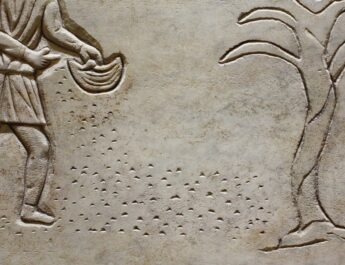Psalm 22:1-11
A Women’s Lectionary – Palm Sunday
To the leader:I according to The DeerII of the Dawn.III A PsalmIV of David.V
I “leader” = natsach. Chief musician or singer, overseer, preeminent, enduring, excelling. Properly, this word means to glitter from afar, thus to be eminent. Especially used of Temple services and the music thereof.
II “deer” = ayeleth. 3x in NT. From ayyal (a hart, stag, deer); from the same as ulam (a porch); from the same as ul (mighty, body, belly); (from an unused root meaning to twist – by implication, to be strong; the body as rolled together; powerful, mighty, strength). This is doe or a lofty tree. Also used figuratively to compliment a young wife.
III “dawn” = schachar. Related to schachar (to look diligently for or to look early). This is dawn, early light, or morning.
IV “psalm” = mizmor. From zamar (to make music praising God); perhaps from zamar (to trim, prune) from the sense of stringed instruments being plucked. This is a melody or psalm; instrumental music for a poem set to a tune.
V “David” = David. Related to dod (beloved, love, or uncle as one who is close to you). This name perhaps means loving or beloved one.
1 My God,VI my God, why have you forsakenVII me?
Why are you so farVIII from helpingIX me, from the wordsX of my groaning?XI
VI “God” = el. Used for God and for a god.
VII “forsaken” = azab. To loosen, abandon, leave, relinquish, permit, fail, leave destitute.
VIII “so far” = rachoq. From rachaq (to be or become far or distant, cast, drive, get, go, keep self, put, remove; to widen in any direction; to recede; to remove). So this word is distant in place or in time – used literally and figuratively.
IX “helping” = yeshuah. From yasha (to deliver, rescue, defend, preserve, avenge; properly, to be open, wide or free and thus to be safe). This is the noun of salvation, deliverance, health, welfare. The word for Messiah in Hebrew and also the names Jesus and Joshua share roots with this word.
X “words” = dabar. From dabar (to speak). This is speech, word, topic, thing, message.
XI “groaning” = sheagah. 7x in OT – 4x of lions roaring and 3x of human groaning. From shaag (to roar, rumble, moan, groan). This is roaring, rumbling, moaning.
2 O my God,XII I cryXIII by day,XIV but you do not answer;
and by night,XV but find no rest.XVI
XII “God” = Elohim.
XIII “cry” = qara. This is to call, proclaim, call out, to address someone by name, call forth, invite, give someone a name, preach, proclaim.
XIV “by day” = yomam. From yom (day, today, daily, each, always, continually); (from an unused root meaning to be hot – so the day as the warm hours). This word could mean daytime or by the day.
XV “night” = layil. Night, midnight. This is properly a twist away of the light. Used figuratively for adversity.
XVI “rest” = dumiyyah. 4x in OT. From an unused root meaning to be silent – used figuratively for death. This word is silence, quiet waiting, stillness. Abstractly, it can mean trust.
3 Yet you are holy,XVII
enthronedXVIII on the praisesXIX of Israel.XX
XVII “holy” = qadosh. Related to qodesh (set apart, sacredness, a sacred place or thing). This word is holy, sacred, a holy one, a saint. This is sacred ceremonially or morally.
XVIII “enthroned” = yashab. Literally, to sit, remain, dwell, abide, continue, establish. Literally refers to sitting down, but by extension this can mean to sit as judge, to sit in ambush, to sit in silence. Further implication of sitting is dwelling somewhere, remaining there. Causatively used for settling or for marrying.
XIX “praises” = tehillah. From halal (to be boastful, to praise). Shares a root with Hallelujah (praise the Lord). This word is praise, song of praise, deep place. Used concretely for a hymn.
XX “Israel” = yisrael. From sarah (to persist, exert oneself, persevere, contend, strive, wrestle; prevail, have power as a prince) + el (God, god). This word is God Strives or one who strives with God. This is a name given to Jacob and his descendants.
4 In you our ancestorsXXI trusted;XXII
they trusted, and you deliveredXXIII them.
5 To you they cried,XXIV and were saved;XXV
in you they trusted, and were not put to shame.XXVI
XXI “ancestors” = ab. Literally father. This word can also mean chief or principal. It is used in a literal and figurative sense.
XXII “trusted” = batach. To trust, be confident, be secure or sure, make to hope. Properly, to hide for refuge – figuratively to trust or be confident.
XXIII “delivered” = palat. This word is to escape, calve, carry away safe, deliver. Literally to slip out (from danger to safety) i.e. escape. Used causatively, it means to deliver someone else.
XXIV “cried” = zaaq. To cry, cry out, call, assemble, call together, gather together. Can also be to shriek from anguish or danger. By analogy, it means to announce as a herald or to convene publicly.
XXV “saved” = malat. Properly, to be smooth. By implication, to escape as if by slipperiness. Causatively, to release or rescue. Used specifically for bringing forth young or for emitting sparks.
XXVI “put to shame” = bosh. To be ashamed or put to confusion. Properly, this means to be pale, which implies being ashamed, disappointed, delayed, or confounded.
6 But I am a worm,XXVII and not human;XXVIII
scornedXXIX by others,XXX and despisedXXXI by the people.XXXII
XXVII “worm” = tola. A maggot that is voracious. Specifically refers to the crimson grub (coccus ilicis), which was used to produce a red dye. Thus, this word can also mean stuff dyed scarlet, crimson, or purple or the dye itself. This word is also used figuratively to mean oppressor.
XXVIII “human” = ish. Literally, a man, male, or husband.
XXIX “scorned” = cherpah. From charaph (betroth, to reproach, blaspheme, defy, rail, upbraid; to pull off, by implication to expose (as by stripping); to betroth as if a surrender; fig. to carp at, defame; to spend the winter, blaspheme, defy). This word is reproach, rebuke, shame, disgrace. It can also be used to refer to genitalia.
XXX “others” = adam. Human, humankind, another. Related to adamah (dirt or ground and, of course, the first human, Adam).
XXXI “despised” = bazah. To despise, disdain, scorn, a vile person.
XXXII “people” = am. From amam (to darken, dim, associate – to overshadow by huddling together). This is people as a congregated unit – so tribe, troops, attendants, folk, people, nation. Also used figuratively for a flock.
7 All who see me mockXXXIII at me;
they makeXXXIV mouthsXXXV at me, they shakeXXXVI their heads;XXXVII
XXXIII “mock” = laag. 19x in OT – 8x of fellow Israelites taunting, 7x of enemies or enemy nations taunting, and 4x of God or wisdom laughing. This is to mock, deride, stammer, or laugh. It implies imitating a foreigner and thus speaking unintelligibly.
XXXIV “make” = patar. 4x in OT. To separate, remove, set free, dismiss, let shoot out, slip away. To cleave or burst through. Causatively to emit literally or figuratively; to gape.
XXXV “mouths” = saphah. This is lip as a boundary of the face so it implies language or speech. It is also other margins or edges – border, brim, brink, edge of a vessel, a bank, etc.
XXXVI “shake” = nua. To quiver, wave, waver, tremble, totter, fugitive, to go up and down. This is to waver literally and figuratively. Used in Genesis 4 to pronounce Cain a fugitive and a wanderer.
XXXVII “heads” = rosh. This is head, captain, band, or company. Root may mean to shake – the head as easily shaken. Head used literally or figuratively.
8 “Commit your causeXXXVIII to the Lord;XXXIX let him deliverXL—
let him rescueXLI the one in whom he delights!”XLII
XXXVIII “commit your cause” = galal. 18x in OT. To roll, roll away, commit, remove, run down, seek occasion, trust. Roll used literally or figuratively. Used of rolling stones, having an opportunity, rolling away scorn or disgrace, wallowing in blood, committing to the Lord, and justice rolling down like waters.
XXXIX “Lord” = YHVH. From havah (to become) or from hayah (to come to pass, become, be). This is the name of the God of Israel; the tetragrammaton; the self-existent and eternal one.
XL “deliver” = palat. Same as “delivered” in v4.
XLI “rescue” = natsal. To strip, plunder, deliver oneself or be delivered, snatch away, defend, escape. To snatch away in a good or bad sense.
XLII “delights” = chaphets. Properly, to incline to, to bend, which figuratively implies being pleased with. This is to desire, delight in, or be pleased with.
9 Yet it was you who tookXLIII me from the womb;XLIV
you kept me safeXLV on my mother’sXLVI breast.XLVII
XLIII “took” = giach. 6x in OT: 3x of birth and labor, 2x of water rushing around, and 1x for rushing out in ambush. This is to burst forth, break forth, labor to bring forth, take out. To gush forth as water, to issue. This is God as midwife.
XLIV “womb” = beten. This is belly, body, or womb. Root may mean to be hollow.
XLV “kept me safe” = batach. This is the Hifil form of the word “trusted” in v4.
XLVI “mother’s” = em. Mother as the bond of the family; human and animal; used literally and figuratively.
XLVII “breast” = shad. Perhaps from shud (to swell up; waste). This is breast, female breast, also the teat of an animal. Some scholars believe that this is the root of El Shaddai, a name for God in the Bible often translated “God Almighty.”
10 On you I was castXLVIII from my birth,XLIX
and since my mother boreL me you have been my God.LI
11 Do not be farLII from me,
for troubleLIII is nearLIV
and there is no one to help.LV
XLVIII “cast” = shalak. To throw out, down, or away. To fling, cast, cast away, hurl, pluck. Used figuratively and literally.
XLIX “from birth” = rechem. Related to racham (compassion, tender love, tender mercy, pity, womb; the womb as cherishing the fetus, thus mercy and compassion). This is a different word for “womb” than the one in v9.
L “mother bore” = beten + em. Literally “my mother’s womb.”
LI “God” = el.
LII “far” = rachaq. Related to “so far” in v1. To widen in any direction; to recede or remove literally or figuratively.
LIII “trouble” = tsarah. From tsar (adversary, affliction, anguish, distress, a tight place); from tsarar (adversary, to bind, be restricted, narrow, cramped; be in affliction, besiege). This is tightness, figurative for trouble, distress, affliction, anguish, tribulation, an adversary.
LIV “near” = qarob. From qarab (to come near, approach). This word is near in place, kindred, or time.
LV “help” = azar. To surround i.e. protect or aid, ally, support.
Image Credit: Nursing home of Joachim and Anna in the Netherlands: Interior chapel, right wall, stained glass: “Psalm 22”, by visual artist Ted Felen, 1982




